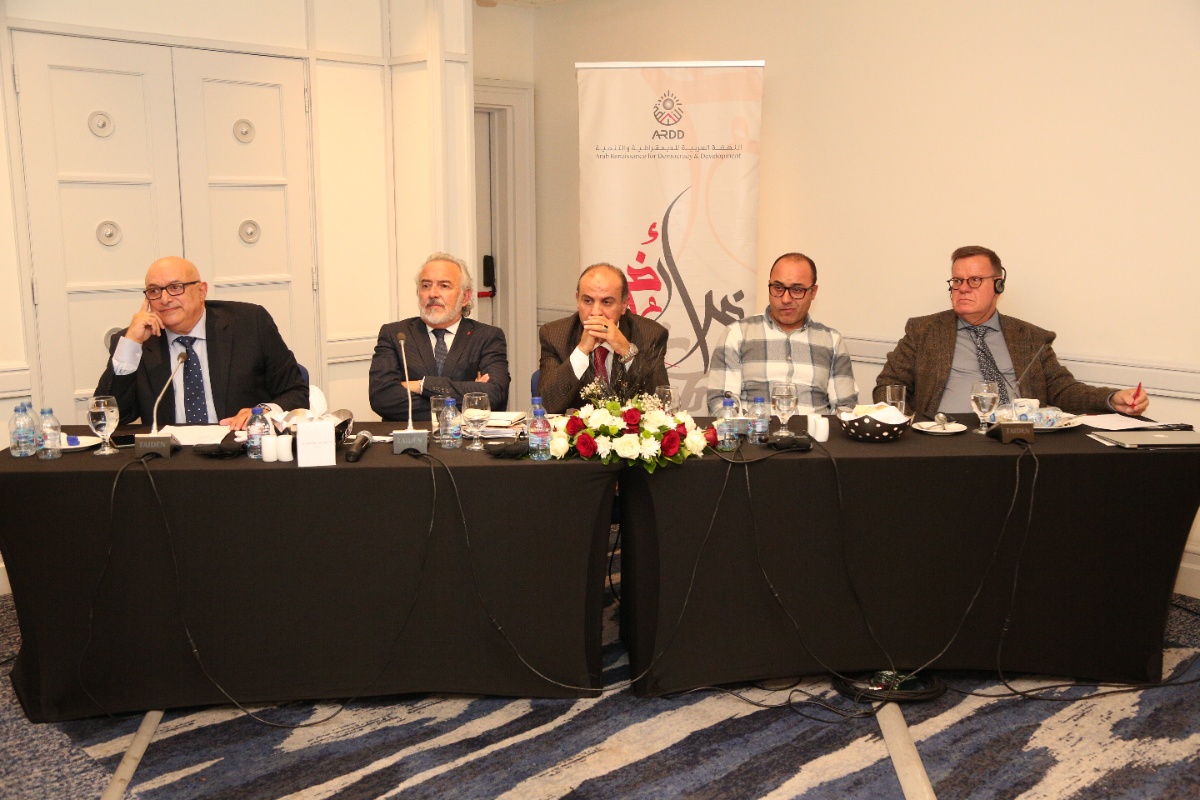In a bid to establish a platform for continuous dialogue and information exchange on issues of interest for Jordan and Palestine, coordinate initiatives working on a joint agenda serving the political and economic interests of these two countries, in view of increased pressure on them, unite efforts within a new working group in Jordan and the region, and encourage the new generation of Jordanians and Palestinians to collaborate, and as part of the Question of Palestine program that has been implemented since 2018, ARDD held a dialogue session titled “Joint action for Jordan and Palestine”. The session was attended by CEO and Founder of Tawthiqi (The Jordan and Gulf Center for Strategic Studies) Mohammed Adwan, from Jordan, and from Palestine, CEO of Burj Alluqluq Social Center Society in Jerusalem Muntaser Edkaidek, ILO representative in Palestine Mounir Qleibo, and Senior Advisor for the Al Nahda Center Lex Takkenberg.
The session was moderated by Mansur, economy expert and former minister of state for economic affairs, who stressed the importance of maintaining the question of Palestine at the center of all Arab causes despite media attempts at mainstreaming the normalization and the agreements signed by states despite peoples’ opposition. He said the fight with the Zionists is one of existence rather than borders, and that the title of the session is not a mere slogan, but a reflection of joint Jordanian-Palestinian efforts to keep the issue alive. Mansur said that Jordan’s policy vis-à-vis Palestine has been consistent ever since the reign of King Hussein bin Talal and through the rule of King Abdullah who is following in his father’s footsteps.
Adwan stressed that the relationship between Jordan and Palestine is that of allies that share genetic traits, ethnicity, language, traditions, and most importantly, a collective mindset.
Edkaidek presented the devastating reality of youth and children, as experienced in the course of his work with Alluqluq Center on education in Jerusalem. “School dropout reached 28%, due to widespread poverty that exceeds 81%. Parents take their kids out of school so they can work and help due to the growing cost of living. Dropout in senior years among high schoolers reached 51%, meaning that the youth of Jerusalem are not tempted by university education anymore due to the high wages of non-university graduates working for the occupation. In Jerusalem, unemployment rates reached a devastating percentage of 18%. In 2021, 2,146 houses were demolished, and youths were unable to travel or represent their country abroad due to identity conflict between a Jordanian passport and Palestinian or Israeli documents,,” he said.
All this, he added, could lead to bigger problems if not solved quickly and properly.
Qleibo spoke about Jordan’s importance to Palestine, describing it as Palestine’s “second lung and protector of the ambitions and hopes of its people”.
He also expressed hope that further support for Palestine, which is today divided into three areas — occupied Jerusalem, the West Bank, and Gaza Strip — and which is enduring unfathomable hardships will be forthcoming. He said that Palestinians should all unite, particularly in view of the fact that “Palestinian institutions have been absent and dependent on donations” rather than focus on real goals.
“In the Jerusalemite job market, 220,000 workers look for jobs on the other side of the separation wall. At ILO, we are training and equipping Palestinians for work, only for the occupation to reap all the benefits when it hires our best youth in the areas of communication and information technology. What concerns us the most is that Jerusalemites do not seek Israeli-issued Palestinian IDs, but rather the extremely costly Israeli citizenship that requires the completion of the civil service,,” he said.
Takkenberg said that the illegitimacy of the Israeli occupation of the Gaza Strip and West Bank are under constant scrutiny, with international organizations and UN agencies issuing reports that confirm Israel’s apartheid policies. He also criticized the double standards of the international community when it comes to Palestine and the war on Ukraine, and stressed that in the last four elections in Israel, there were no signs of serious efforts toward peace and that the Abraham Accords gave the occupation a sense of newly found legitimacy in the Arab world. “However, one quick look at the street and it is evident that the people in the Arab world are strong believers in Palestine,” he said.
Participants stressed the importance of countering attempts to divide the two peoples (Jordanian and Palestinian), presenting Israel as an occupier and not only as an apartheid country, to keep attention focused on the main issue, and investing in media to highlight the dangers facing the region and the results of the latest Israeli elections that are causing real concerns to Jordan.
They called for uniting efforts to defend both Jordan and Palestine, as defending Amman is defending Jerusalem, and stressed the importance of holding continuous dialogues and meetings to unite the visions and work of all relevant parties.


